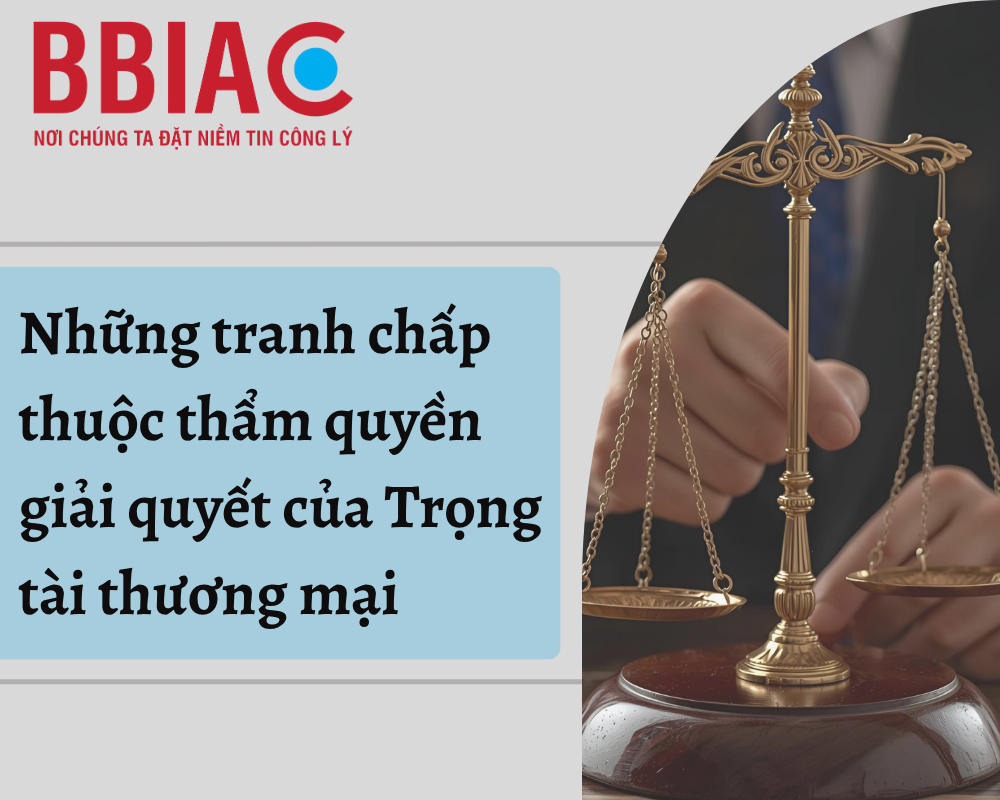Disputes falling within the jurisdiction of commercial arbitration

1. Overview of Commercial Arbitration
Commercial arbitration is defined in the Dictionary of Law as “a method of dispute resolution conducted by a neutral third party, with the consent of the disputing parties, whose decision is final and binding upon them.” This definition demonstrates that the use of arbitration as a dispute resolution mechanism requires the mutual consent of all disputing parties.
Under Vietnamese law, Clause 1, Article 3 of the Law on Commercial Arbitration 2010 provides that: “Commercial arbitration is a method of dispute resolution agreed upon by the parties and conducted in accordance with the provisions of this Law.” This means that the parties’ consent must be expressed through a written agreement. In the absence of such agreement or mutual consent between the disputing parties, the arbitral tribunal lacks jurisdiction. This constitutes a necessary condition for determining whether commercial arbitration has jurisdiction to resolve a dispute.
2. Legal Provisions on the Jurisdiction of Arbitration in Dispute Resolution
Pursuant to Article 2 of the Law on Commercial Arbitration 2010, the jurisdiction of arbitration in resolving disputes is stipulated as follows:
“1. Disputes between the parties arising from commercial activities.
2. Disputes arising between the parties in which at least one party is engaged in commercial activities.
3. Other disputes between the parties that are prescribed by law to be resolved by arbitration.”
The term commercial activities is understood to refer to activities conducted for profit-making purposes, including the purchase and sale of goods, the provision of services, investment, trade promotion, and other profit-oriented activities.
In addition, the other disputes mentioned in Clause 3 of this Article refer to disputes arising from non-commercial activities, as derived from the relevant provisions of labor law concerning the resolution of labor disputes through arbitration.
3. Types of Disputes Falling within the Jurisdiction of Commercial Arbitration
Based on the provisions mentioned above, the types of disputes that may be resolved through arbitration – a flexible and expeditious dispute resolution procedure – include the following:
(1) Commercial disputes: These are disputes between parties to a commercial contract involving the trading of goods or services governed by the Law on Commerce 2005. Disputes arising from commercial activities are common and may include, for example: disputes over the sale of goods, provision of services, disputes among company members, or disputes between a non-member and a company member.
(2) Disputes arising from business activities or transactions involving profit-seeking purposes: These are disputes originating from civil contracts where at least one party conducts the transaction for profit, and such relationships are governed by the Civil Code 2015. Common examples include disputes between enterprises and consumers (e.g., disputes over credit agreements between banks and customers, or disputes arising from standard-form contracts between businesses and clients), and post-employment disputes (e.g., disputes arising from confidentiality agreements or non-compete clauses).
(3) Other disputes prescribed by law to fall under arbitral jurisdiction: This category includes specific disputes expressly assigned by law to arbitration, even if they do not arise directly from commercial activities.
- These include disputes under labor law concerning the rights, interests, and obligations arising from labor contracts between employees and employers or involving third parties. The Labor Code 2019, in Chapter XIV on the settlement of labor disputes, specifies the jurisdiction and authority of the Labor Arbitration Council.
- Disputes related to investment and business activities in Vietnam are first to be settled through negotiation or mediation. If such negotiation or mediation fails, the dispute shall be resolved by arbitration or a court, as provided in Article 14 of the Law on Investment 2020.
- The Law on Enterprises 2020, under Articles 62 and 151, provides that members, groups of members, shareholders, or groups of shareholders have the right to request a court or an arbitral tribunal to review and annul resolutions or decisions of the Members’ Council or the General Meeting of Shareholders.
- Where the parties to a construction contract cannot reach a mutual agreement, the dispute shall be settled through mediation, commercial arbitration, or a court in accordance with the law, pursuant to Clause 8, Article 146 of the Law on Construction 2014.
- In addition, under Clause 1, Article 338 of the Maritime Code 2015, parties to maritime disputes may settle their disputes through negotiation, agreement, or by filing a claim before an arbitral tribunal or a competent court.
4. Mechanisms for Resolving Disputes through the Bigboss International Arbitration Center (BBIAC)
To resolve a dispute through commercial arbitration at BBIAC, clients may insert one of the following two clauses into their contracts:
4.1. Model Arbitration Clause
“Any dispute arising out of or in connection with this contract shall be settled by arbitration at the BIGBOSS International Commercial Arbitration Center (BBIAC) in accordance with the Arbitration Rules of Procedure of this Center.”
Additionally, the parties may supplement the clause with:
(a) The number of arbitrators shall be [one or three].
(b) The seat of arbitration shall be [city and/or country].
(c) The governing law of the contract shall be [ ].*
(d) The language of the arbitration shall be [ ].**
Notes:
* Applicable only to disputes involving a foreign element.
** Applicable only to disputes involving a foreign element or disputes where at least one party is an enterprise with foreign invested capital.
4.2. Model Arbitration Clause Applicable to Expedited Procedure
“Any dispute arising out of or in connection with this contract shall be settled by arbitration at the BIGBOSS International Commercial Arbitration Center (BBIAC) in accordance with the Arbitration Rules of Procedure of this Center. The Parties agree that the arbitration proceedings shall be conducted under the Expedited Procedure stipulated in Article 37 of the BBIAC Arbitration Rules of Procedure.”
Additionally, the parties may supplement the clause with:
(a) The seat of arbitration shall be [city and/or country].
(b) The governing law of the contract shall be [ ].*
(c) The language of the arbitration shall be [ ].**
Notes:
* Applicable only to disputes involving a foreign element.
** Applicable only to disputes involving a foreign element or disputes where at least one party is an enterprise with foreign invested capital.
Contact 0979 133 955 for consultation!
